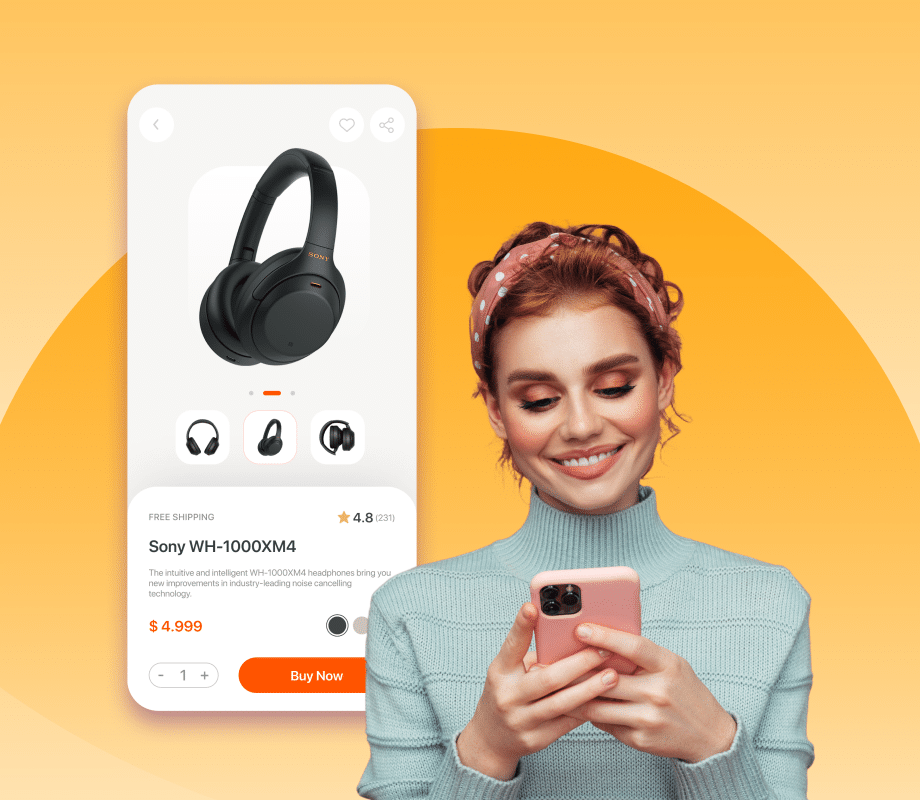As per Gartner® in the Hype Cycle™ for Retail Technologies, 2024 Research, “to navigate a disruptive and unpredictable digital business environment, retailers need to invest in innovative technology that improves insight and supports unified commerce operations.”
As per the Gartner® report, “Algorithmic retailing connects big data to results, helping retailers navigate from descriptive to prescriptive analytics. It includes identifying data sources, data fabric and advanced analytics, and applying mathematical algorithms that will lead to highly repeatable business processes. It requires AI to drive effective decision making and robotic and hyperautomation to drive execution.” According to Gartner’s estimation of Market Penetration, “More than 50% of target audience have adopted some form of algorithmic optimization applications.” 1
Two technologies in particular are game-changing according to us - Guided Selling Assistants and Personalization Engines. While guided selling assistants are transforming the way customers navigate product choices, personalization engines use data to make every customer interaction feel uniquely relevant.
Leading Innovation in Digital Commerce
Sample Vendor
- Algonomy is listed as a Sample Vendor for Algorithmic Retailing category in the Gartner® Hype Cycle™ for Retail Technologies, 2024 report.
- Algonomy is listed as a Sample Vendor for Guided Selling Assistant category and Personalization Engines category in the Gartner® Hype Cycle™ for Digital Commerce, 2024 report.
In this blog post, we’ll explore these technologies in depth: how they work, what makes them important, and the benefits businesses can hope to drive out of them.
Revolutionizing Product Discovery with Guided Selling Assistants
Guided Selling Assistants are interactive tools for self-service product discovery. They use conversational interfaces, such as quizzes, to understand the needs of potential buyers, and guide them towards the most suitable products or solutions.
According to Gartner® in the Hype Cycle™ for Digital Commerce, 2024 - Gartner Research, “Guided selling assistants help buyers reduce research efforts and quickly identify suitable ranges of solutions”. Gartner® also states that, “Guided selling assistants improve conversion and AOV for digital commerce by making personalized recommendations based on buyer intent and preferences and providing rich content including text, images and video.”
In our experience, guided selling solution is quite compelling for a few different reasons:
 Zero-Party Data Guided selling assistants capture zero-party data through consumers' responses, enriching user profiles. This enriched data is foundational for creating personalized experiences, improving recommendations, content, search, and other key touchpoints.
Zero-Party Data Guided selling assistants capture zero-party data through consumers' responses, enriching user profiles. This enriched data is foundational for creating personalized experiences, improving recommendations, content, search, and other key touchpoints. Enhanced Clienteling Guided selling assistants act as virtual sales assistants, supporting in-store associates in recommending the perfect product to visitors. This is particularly valuable in categories with a vast range of products, where it can be challenging for sales associates to master every detail.
Enhanced Clienteling Guided selling assistants act as virtual sales assistants, supporting in-store associates in recommending the perfect product to visitors. This is particularly valuable in categories with a vast range of products, where it can be challenging for sales associates to master every detail. Gift Finder Applications A common use case for guided selling assistants are gift finders, allowing people to shop for others by feeding in explicit data about the intended recipient’s preferences and the buyer’s budget, amongst other things.
Gift Finder Applications A common use case for guided selling assistants are gift finders, allowing people to shop for others by feeding in explicit data about the intended recipient’s preferences and the buyer’s budget, amongst other things.
For guided selling assistants to truly shine, they need to be supported by robust personalization capabilities. This is where personalization engines come into play. They provide the data-driven insights that enhance the guidance provided by these assistants, ensuring that the recommendations are not only accurate but also highly relevant to each individual user.
Integrating Personalization with Guided Selling solution for a Seamless Experience
Personalization Engines are sophisticated tools designed to enhance digital interactions by tailoring content, offers, search results, and recommendations to individual users based on their data and context. They use a blend of user behavior, contextual information, and advanced algorithms to create personalized experiences across various digital channels.
This directly complements the capabilities of Guided Selling Assistants, and helps maximize their customer value with two key ingredients - first-party user data and product data.
 Gartner stated that, “The 2024 Gartner®CMO Spend Survey reveals that personalization is currently the largest-reported capability gap, despite a 30% year-on-year increase in budget allocated to personalization efforts.” 2
Gartner stated that, “The 2024 Gartner®CMO Spend Survey reveals that personalization is currently the largest-reported capability gap, despite a 30% year-on-year increase in budget allocated to personalization efforts.” 2 Gartner notes, “As per the 2024 Gartner®CMO Spend Survey, organizations now allocate 26.8% of the entire marketing budget to personalization efforts, with technology accounting for the largest share of that budget (almost 20%).” 2
Gartner notes, “As per the 2024 Gartner®CMO Spend Survey, organizations now allocate 26.8% of the entire marketing budget to personalization efforts, with technology accounting for the largest share of that budget (almost 20%).” 2 Gartner states, “According to the 2023 Gartner®Marketing Technology Survey, only 14% of marketing technology leaders say that they are utilizing their personalization platform’s capabilities.” 2
Gartner states, “According to the 2023 Gartner®Marketing Technology Survey, only 14% of marketing technology leaders say that they are utilizing their personalization platform’s capabilities.” 2
Is Nailing Personalization Getting Tougher?
A robust personalization platform relies on first-party customer data integrated from diverse sources to maintain relevance. The same data profile can be utilized by guided selling assistants and combined with explicit responses from the shopper to serve the most-suited recommendations. This enhances user experience and willingness to purchase.
For guided selling solution to be effective, organizations need accurate and enriched product data. Incomplete or outdated information can lead to suboptimal recommendations and user experiences. To address this problem, personalization engines leverage Generative AI to enrich product catalogs with attributes and descriptions.
Imagine a customer visiting an online store looking for a gift. The personalization engine uses data from previous interactions, browsing history, and contextual information (like recent searches or location) to tailor the options presented. When this customer engages with a guided selling assistant, the assistant leverages the data from the personalization engine to provide specific gift recommendations, ask targeted questions to narrow down choices, and suggest complementary items based on the customer’s preferences.
Conclusion
By combining the data-driven insights of personalization engines with the interactive, real-time support of guided selling assistants, businesses can create a seamless and engaging buyer journey that enhances conversion rates, boosts average order values, and elevates overall customer satisfaction.
Algonomy’s solutions excel in this integrated approach. Discover how we can help you achieve a more personalized, efficient, and impactful digital commerce experience.
Sources (Reports accessible to Gartner® subscribers only):
GARTNER is a registered trademark and service mark of Gartner, Inc. and/or its affiliates in the U.S. and internationally, and HYPE CYCLE is a registered trademark of Gartner, Inc. and/or its affiliates and are used herein with permission. All rights reserved.
Gartner does not endorse any vendor, product or service depicted in its research publications, and does not advise technology users to select only those vendors with the highest ratings or other designation. Gartner research publications consist of the opinions of Gartner’s research organization and should not be construed as statements of fact. Gartner disclaims all warranties, expressed or implied, with respect to this research, including any warranties of merchantability or fitness for a particular purpose.
 in Sweden from 7 - 8 October 2025. Pre-book a meeting to connect with our
product experts.
in Sweden from 7 - 8 October 2025. Pre-book a meeting to connect with our
product experts.










